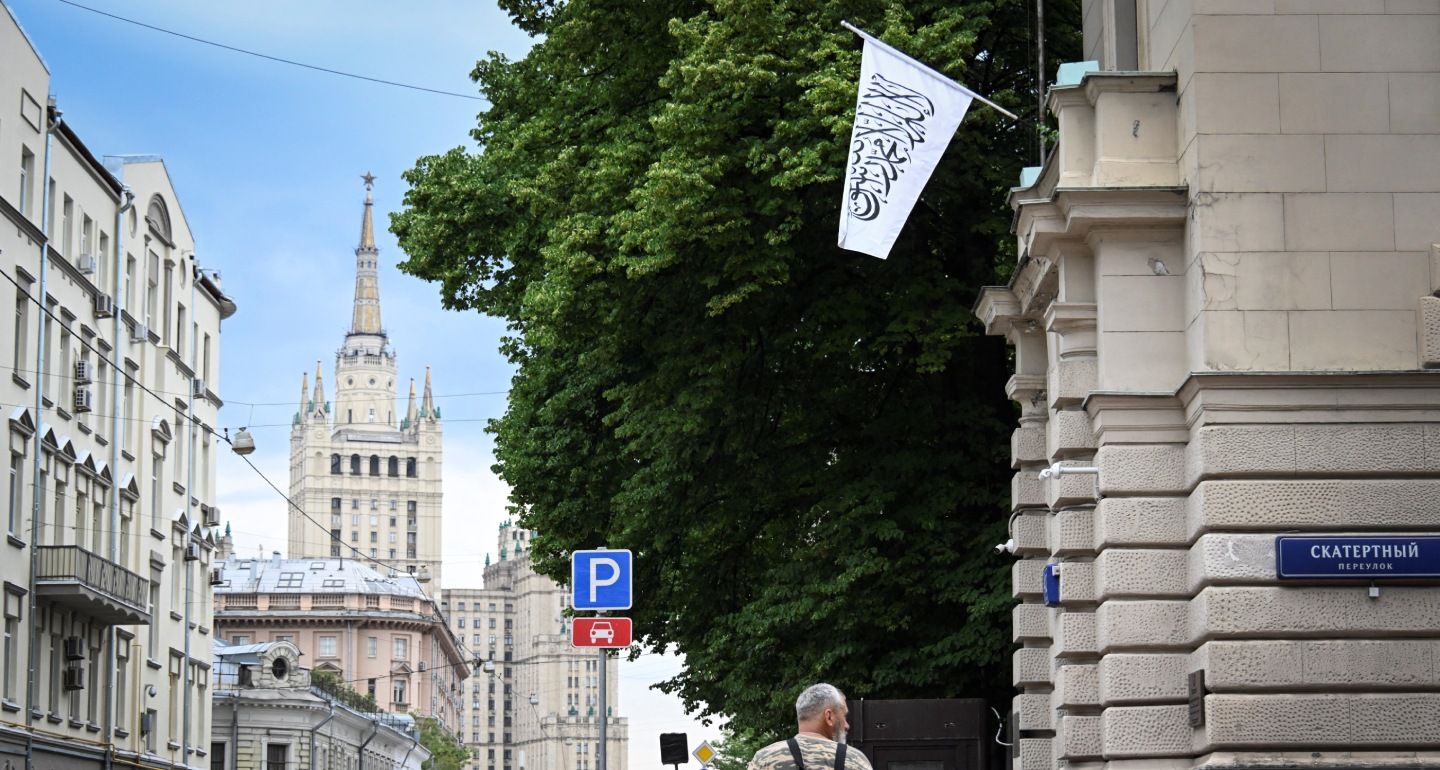The Russian army is not currently struggling to recruit new contract soldiers, though the number of people willing to go to war for money is dwindling.
Dmitry Kuznets
{
"authors": [
"Nikita Smagin"
],
"type": "commentary",
"blog": "Carnegie Politika",
"centerAffiliationAll": "",
"centers": [
"Carnegie Endowment for International Peace",
"Carnegie Russia Eurasia Center"
],
"collections": [
"Politika: The Best of 2025"
],
"englishNewsletterAll": "",
"nonEnglishNewsletterAll": "",
"primaryCenter": "Carnegie Russia Eurasia Center",
"programAffiliation": "",
"programs": [],
"projects": [],
"regions": [
"Russia",
"Afghanistan",
"Middle East"
],
"topics": [
"Foreign Policy",
"Security",
"Global Governance"
]
}
Source: Getty
Moscow needs to take steps that will restore its image as an influential power that holds the initiative, and recognition of the Taliban regime serves precisely that purpose.
After several years of vacillation, Russia has become the first country in the world to officially recognize the Taliban government in Afghanistan. It’s more of a symbolic gesture than down to any trade or economic considerations. Following a series of recent setbacks for the Kremlin and its partners in the Middle East, Russia is trying to restore its image as a global power that determines the international agenda and is not afraid to set controversial precedents.
Russia has long been moving toward recognizing the Taliban government. Back in 2017, it initiated the “Moscow format” for coordinating approaches to the Afghan peace settlement, inviting both representatives of the then pro-Western government in Kabul and their opponents in the Taliban, as well as other countries in the region.
When Taliban militants triumphantly entered the Afghan capital in August 2021, Russia was already deemed eligible for special treatment. Its diplomatic mission was immediately provided with security, and Russian Ambassador Dmitry Zhirnov became the first foreign diplomat to meet with the new rulers of Afghanistan.
That same year, Russian President Vladimir Putin first acknowledged the possibility of dropping Russia’s classification of the Taliban as a terrorist organization. But it was only four years later, in April 2025, that Russia’s Supreme Court removed the Taliban from the list of terrorist organizations, followed by the official recognition earlier this month.
The reason it took so long was that there was no clear consensus within the Russian government on how to deal with those who were deemed terrorists not so long ago. While the Russian Foreign Ministry insisted on excluding the Taliban from blacklists wherever possible, many in the Russian security services questioned that approach.
Moreover, the Taliban made it clear they had no intention of currying favor with the international community for recognition. They have largely ignored demands from other countries in the region, as well as from China and Russia, to make their government more inclusive. That made recognizing the Taliban government a one-sided advance. Still, slowly but surely, the “objective reality” argument won out in Moscow: the Taliban is in power in Afghanistan and will likely be for a long time to come, and so dealings must be had with them.
An additional motivation was likely the rapid legitimization by Western countries of the new Islamist authorities in Syria who overthrew the former president, Bashar al-Assad. That convinced the Kremlin once again that international relations have conclusively descended into an extreme form of realism in which it is both possible and necessary to turn a blind eye to ethical qualms. The two processes progressed virtually in parallel: just a few days after the Russian authorities recognized the Islamic Emirate of Afghanistan, the U.S. authorities removed Hayat Tahrir al-Sham, which now rules Syria, from its own list of terrorist organizations.
When the Taliban came to power, economic cooperation between Russia and Afghanistan got a boost that was visible even to ordinary Russian consumers: amid the departure of foreign brands, Afghan Coca-Cola appeared on Russian store shelves. But Afghanistan is ranked second-to-last in the world in terms of nominal per capita GDP, and trade turnover between the two countries was a modest $323 million at the end of 2024.
Now official recognition of the Taliban government has given rise to talk of possible joint investment projects, most notably the construction of a gas pipeline from Turkmenistan to connect the Russian gas system with the markets of Pakistan and India. Ideas are also being floated of helping Afghanistan to build highways and tunnels that would connect it to various transit and logistics corridors. Among the most optimistic ideas is Russian involvement in the creation of a Trans-Afghan Railway that would become part of the North-South international transport corridor from South Asia to Europe.
The problem with all of these projects is financing. Afghanistan will be only too glad to receive any Russian investment, but it has no means of paying for them. In other words, Russia can build there—but only at its own expense. In addition, these would very likely be initiatives whose profitability is at best questionable, while at worst the money would simply be lost, as has happened many times in the past: just look at Russia’s investments in Syria.
Nor would it be wise to overlook the complex security situation in the region. Overall, Afghanistan is far more stable today than it was in the last years of the U.S. presence, when the country was torn apart by civil war. But that is a low threshold, and there is no guarantee that Afghanistan will be a model of stability under the Taliban. Moreover, the state of affairs there depends to a large extent on neighboring states, including Iran, where Israeli airstrikes have thrown the future of the regime into question.
The Kremlin is likely under no illusions about Afghanistan’s economic potential or the stability of the current regime. Recognition of the Taliban is first and foremost a symbolic move. It comes as Russia’s key partners in the Middle East suffer one defeat after another. At the end of 2024, Moscow lost an ally in the form of the Assad regime in Syria, where, once the Islamists seized power, Russia had to greatly curtail its presence. The fate of its military bases there remains up in the air.
Another unwelcome development was the Israeli airstrikes against Iran. While the Iranian regime has held out for now, a resumption of hostilities cannot be ruled out. In addition, the escalation confirmed calculations that Moscow was not prepared to defend its Iranian partner or to provide it with the necessary weapons.
The Kremlin’s problems in the Middle East are now far broader than the decrease in its Syria contingent and the possible collapse of its investment projects in Iran. Russia is perceived less and less as a great power that cannot be ignored. This was also demonstrated by the recent tensions in relations with Azerbaijan, where a wave of arrests of Russian nationals followed the custody deaths of two ethnic Azeris in Russia. Such a response would have been very hard to imagine until recently.
Moscow needs to take steps that will restore its image as an influential power that holds the initiative, and recognition of the Taliban regime serves precisely that purpose. The status of the first country to establish official diplomatic relations with the Taliban government should ensure Russia has a leading role in discussions of regional security issues.
In addition, one of the attributes of a world power is the ability to determine the rules of the game. The recognition of the Taliban is an attempt by Russia to prove itself as a leading global force that is not afraid to break established norms and set precedents for other countries.
The Taliban flag flying over the Afghan embassy in Moscow is meant to symbolize that Russia is setting the agenda in the Middle East and Central Asia. But that’s not necessarily how other countries in the region will perceive this move. Rather, it will send a clear signal to a different audience. Combined with the Trump administration’s decision to remove Syria’s new rulers from the U.S. list of terrorist organizations, Russia’s recognition of the Taliban shows Islamist groups around the world that if they seize power, they will inevitably be recognized.
Carnegie does not take institutional positions on public policy issues; the views represented herein are those of the author(s) and do not necessarily reflect the views of Carnegie, its staff, or its trustees.
The Russian army is not currently struggling to recruit new contract soldiers, though the number of people willing to go to war for money is dwindling.

Dmitry Kuznets
Insisting on Zelensky’s resignation is not just a personal vendetta, but a clear signal that the Kremlin would like to send to all its neighbors: even if you manage to put up some resistance, you will ultimately pay the price—including on a personal level.

Vladislav Gorin
For Putin, upgrading Russia’s nuclear forces was a secondary goal. The main aim was to gain an advantage over the West, including by strengthening the nuclear threat on all fronts. That made growth in missile arsenals and a new arms race inevitable.

Maxim Starchak
For a real example of political forces engaged in the militarization of society, the Russian leadership might consider looking closer to home.

James D.J. Brown
The risk posed by Lukashenko today looks very different to how it did in 2022. The threat of the Belarusian army entering the war appears increasingly illusory, while Ukraine’s ability to attack any point in Belarus with drones gives Kyiv confidence.

Artyom Shraibman